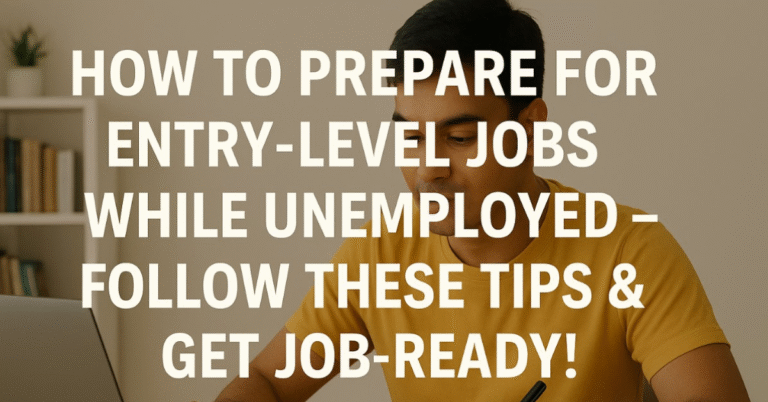Being unemployed can feel discouraging, but it can also be one of the best opportunities to prepare yourself for a brighter future. For many job seekers, entry-level positions are the first step into the professional world. These jobs may not require extensive qualifications or experience, but they do demand dedication, adaptability, and preparation. Whether you are a recent graduate, a school dropout, or someone restarting your career, your period of unemployment can be turned into a productive time. In this blog, we will explore practical steps, strategies, and resources that will help you prepare effectively for entry-level jobs while unemployed.
Why Entry-Level Jobs Are a Good Starting Point
Entry-level jobs serve as stepping stones for career growth. They may seem basic at first, but they offer numerous benefits:
-
Skill building – Hands-on training for professional development.
-
Networking opportunities – Connect with seniors and colleagues.
-
Confidence boost – Helps overcome the fear of entering the workforce.
-
Career direction – Allows you to explore different industries before choosing a long-term path.
-
Income generation – Provides financial support while gaining experience.
Step 1: Assess Your Current Skills
Before applying anywhere, list out what skills you already have. These could be:
-
Soft skills: Communication, teamwork, time management.
-
Technical skills: Basic computer knowledge, data entry, or industry-specific know-how.
-
Practical skills: Driving, cooking, tailoring, sales.
👉 Tip: Use self-assessment tools like NCS (National Career Service) portal to check where your skills match available jobs.
Step 2: Build Relevant Skills During Unemployment
Instead of wasting time, focus on developing new abilities. Free and paid options are widely available.
-
Online Platforms: Coursera, Udemy, Skill India, SWAYAM.
-
Government Schemes: PMKVY (Pradhan Mantri Kaushal Vikas Yojana), NSDC (National Skill Development Corporation).
-
Short-term courses: Data entry, digital marketing, MS Excel, spoken English, driving license training.
Learning during unemployment increases your employability and shows recruiters that you are proactive.
Step 3: Prepare a Strong Resume
Your resume is your first impression. Even without job experience, you can make it stand out:
-
Highlight skills, certifications, and volunteer work.
-
Use a clean format with bullet points.
-
Avoid grammar mistakes.
-
Include a short objective like: “Looking for an entry-level role to apply my skills in [field] while contributing to the organization’s success.”
👉 Tools like Canva Resume Builder and Zety can help.
Step 4: Practice Interview Skills
Entry-level jobs often have simple interviews, but confidence matters.
-
Prepare answers for common questions like:
-
“Tell me about yourself.”
-
“Why do you want this job?”
-
“What are your strengths and weaknesses?”
-
-
Practice speaking in front of a mirror.
-
Record yourself to improve body language and tone.
-
Join mock interviews online or in training centers.
Step 5: Gain Experience Through Internships or Volunteering
Employers love practical exposure, even if unpaid.
-
Volunteer at NGOs, community events, or local shops.
-
Take small internships through platforms like Internshala, Apna App, and Naukri.com.
-
Freelance small tasks like data entry, tutoring, or delivery jobs.
This not only fills your resume but also builds confidence.
Step 6: Build an Online Profile
Today, most recruiters search online before hiring.
-
Create a LinkedIn profile with your skills, education, and achievements.
-
Join professional groups to connect with recruiters.
-
Sign up on job portals like Naukri, Monster India, Shine, Apna, and Indeed.
-
Keep your profile updated for better visibility.
Step 7: Work on Personality Development
Employers prefer candidates who are well-presented and confident.
-
Improve communication: Practice speaking English and your regional language fluently.
-
Dress professionally: Simple, neat clothes for interviews.
-
Work on body language: Maintain eye contact, smile, and sit upright.
Even a basic personality development course can significantly improve your chances.
Step 8: Financial Readiness During Job Search
Being unemployed is tough financially, but smart planning helps.
-
Take up part-time gigs like food delivery, tutoring, or shop assistance.
-
Reduce unnecessary expenses.
-
Use government support schemes like unemployment allowances available in some states.
This ensures you can focus on preparation without worrying about money constantly.
Step 9: Stay Motivated and Disciplined
Job searching can be exhausting. Maintaining positivity is key.
-
Create a daily routine with learning, job searching, and exercise.
-
Avoid comparing yourself with others.
-
Track applications to stay organized.
-
Celebrate small wins like getting interview calls.
Entry-Level Job Options in India
Here are some good options where you can start:
-
Retail & Sales Associate (shops, malls, FMCG companies).
-
Customer Service Representative (call centers, BPOs).
-
Delivery Partner (Swiggy, Zomato, Blinkit, Amazon).
-
Office Assistant / Data Entry Operator.
-
Hospitality Staff (hotels, restaurants, housekeeping).
-
Technician or Apprentice Jobs (manufacturing units, workshops).
-
Field Sales Executive (telecom, insurance, banking).
Government Schemes to Help the Unemployed Prepare
Common Mistakes to Avoid While Preparing
-
Applying everywhere without tailoring resumes.
-
Waiting for the “perfect” job instead of starting with what’s available.
-
Ignoring soft skills like communication and teamwork.
-
Not following up with recruiters after interviews.
-
Losing motivation too quickly.
Conclusion
Preparing for entry-level jobs while unemployed requires focus, patience, and consistency. Instead of wasting time worrying about the lack of opportunities, use this period to upgrade skills, build confidence, and practice interviews. Remember, entry-level jobs are stepping stones that give you income, exposure, and the right direction for your career. With smart preparation, self-discipline, and use of available resources like online platforms and government schemes, you can turn unemployment into an opportunity for growth. The sooner you start preparing, the closer you get to your first job offer.

